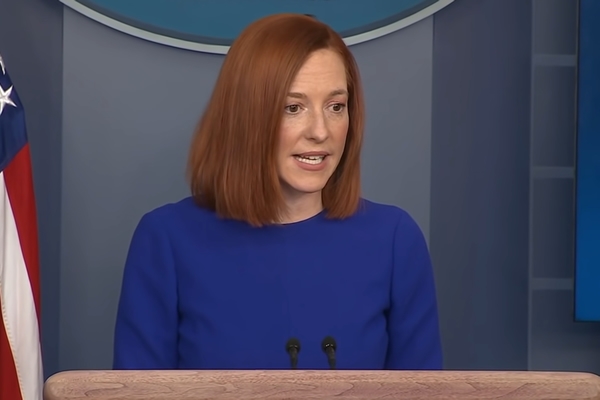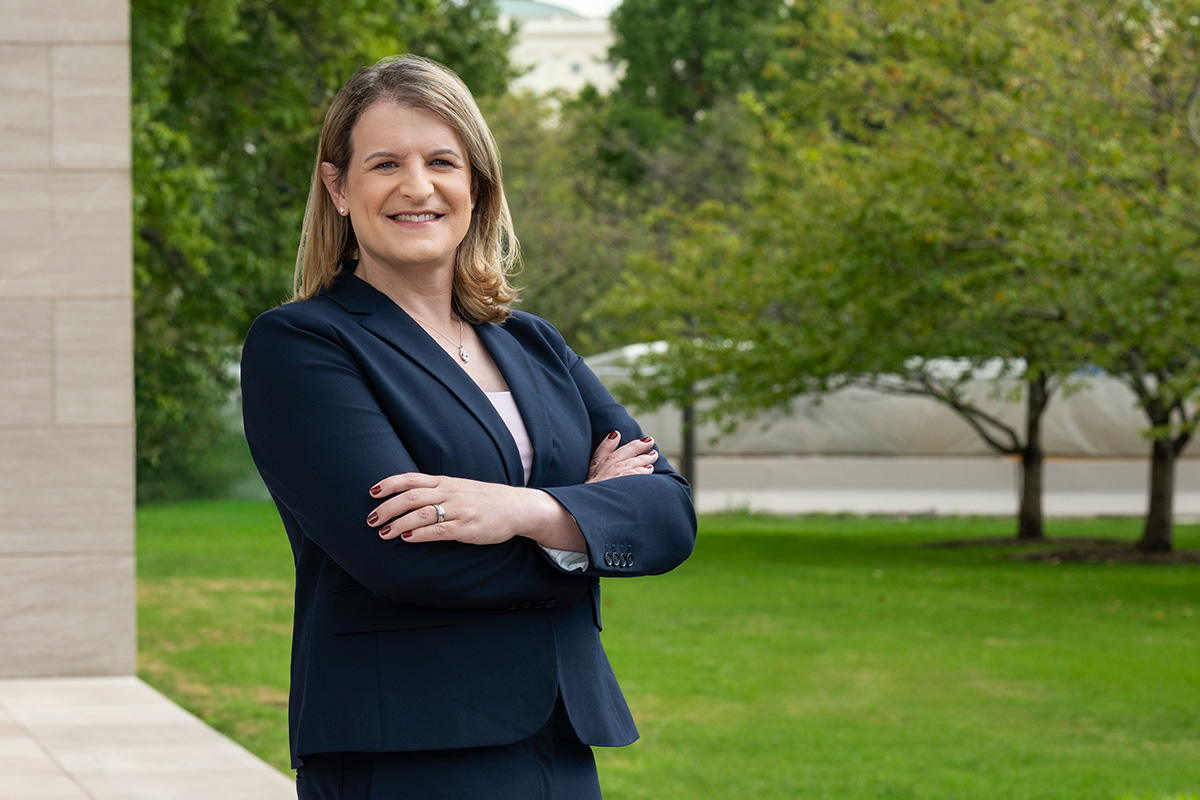News
White House vague on whether Biden will confront Putin over anti-LGBTQ abuses
WH spokesperson defers for State Dept. on engagement

White House Press Secretary Jen Psaki was vague Friday on whether President Biden — after an initial call with Vladimir Putin on election interference, hacking into the U.S. government and possible bounties on U.S. troops — would similarly confront him on anti-LGBTQ human rights abuses in Russia.
Psaki made the comments in response to a question from the Washington Blade in the aftermath of a report this week that Russia arrested and detained two men perceived as gay and forcibly returned them to Chechnya, where they face persecution.
“Well, the president is not afraid to make clear to President Putin the areas where he has disagreement, areas where he is concerned,” Psaki said, without elaborating on whether that includes anti-LGBTQ abuses.
The incident in Russia was the latest report of the Kremlin essentially giving a wink and nod to Chechnya over anti-LGBTQ human rights abuses at the hands of the government in the semi-autonomous Republic, including reports of concentration camps for gay men. Russia and Chechnya have denied any abuses.
Psaki pointed out Biden’s call with Putin had occurred weeks ago, so “the next contacts with the Russians would be at a lower level either at the State Department or other officials” and deferred to them “for a more up-to-date response on our engagement.”
Asked whether sanctions would be appropriate for anti-LGBTQ abuses in Russia or elsewhere, Psaki declined to comment and cited an ongoing review of Russia’s adverse actions on the world stage.
“There’s a review that’s ongoing about a range of problematic actions that have been taken by the Russians,” Psaki said. “And I’m not going to get ahead of that process.”
That’s consistent with Psaki in the past several weeks citing an ongoing review within the Biden administration, including the poisoning and arrest of Putin rival Alexei Navalny, when asked about possible consequences or sanctions for Russia.
During the Trump administration, the White House response was virtually non-existent at the height of reports of anti-LGBTQ abuses in Chechnya in 2017. Former White House Press Secretary Sarah Huckabee Sanders said she didn’t know whether the issue came up in a meeting between former President Trump and the Russian ambassador, nor whether Trump had been briefed on the reported atrocities.
State Department spokesperson Ned Price, who previously said the Biden administration was “troubled” by the account in Russia, had no updates when asked by the Blade during the Friday teleconference, saying “you’ve heard me, you’ve heard others speak out forcibly about Russia’s abysmal human rights record.”
Price did note, however, Biden’s presidential memorandum that commits the U.S. to promoting LGBTQ rights abroad.
“The president, then-candidate Biden committed on the campaign trail to prioritizing the protection and defense of LGBTQI rights around the world, and he made good on that promise early in the administration by issuing the presidential memorandum that you saw several days ago,” he said in response to the Blade’s question. “It is now once again officially the policy of the United States, of the Biden-Harris administration, to stand up for and to defend the rights of LGBTQI people.”
Michael K. Lavers contributed to this story.
Federal Government
Top Democrats reintroduce bill to investigate discrimination against LGBTQ military members
Takano, Jacobs, and Blumenthal sponsored measure

Multiple high-ranking members of Congress reintroduced the Commission on Equity and Reconciliation in the Uniformed Services Act into the U.S. House of Representatives and the U.S. Senate, aiming to establish a commission to investigate discriminatory policies targeting LGBTQ military members.
Three leading Democratic members of Congress — U.S. Rep. Mark Takano (D-Calif.), who is the House Veterans’ Affairs Committee’s ranking member and chairs the Congressional Equality Caucus; U.S. Sen. Richard Blumenthal (D-Conn.), who is the Senate Veterans’ Affairs Committee’s ranking member; and U.S. Rep. Sara Jacobs (D-Calif.) — introduced the bill on Tuesday.
The bill, they say, would establish a commission to investigate the historic and ongoing impacts of discriminatory military policies on LGBTQ servicemembers and veterans.
This comes on the one-year anniversary of the Trump-Vance administration’s 2025 Executive Order 14183, titled “Prioritizing Military Excellence and Readiness,” which essentially banned transgender servicemembers from openly serving in the Armed Forces, leading to the forced separation of thousands of capable and dedicated servicemembers.
In a joint statement, Takano, Blumenthal, and Jacobs shared statistics on how many service members have had their ability to serve revoked due to their sexual orientation:
“Approximately 114,000 servicemembers were discharged on the basis of their sexual orientation between WWII and 2011, while an estimated 870,000 LGBTQ servicemembers have been impacted by hostility, harassment, assault, and law enforcement targeting due to the military policies in place,” the press release reads. “These separations are devastating and have long-reaching impacts. Veterans who were discharged on discriminatory grounds are unable to access their benefits, and under the Trump administration, LGBTQ+ veterans and servicemembers have been openly persecuted.”
The proposed commission is modeled after the Congressional commission that investigated and secured redress for Japanese Americans interned during World War II. Takano’s family was among the more than 82,000 Japanese Americans who received an official apology and redress payment under that commission.
The press release notes this is a major inspiration for the act.
“Qualified servicemembers were hunted down and forced to leave the military at the direction of our government,” said Takano. “These practices have continued, now with our government targeting transgender servicemembers. The forced separation and dishonorable discharges LGBTQ+ people received must be rectified, benefits fully granted, and dignity restored to those who have protected our freedoms.”
“LGBTQ+ servicemembers have long been the target of dangerous and discriminatory policies—resulting in harassment, involuntary discharge, and barriers to their earned benefits,” said Blumenthal. “Establishing this commission is an important step to understand the full scope of harm and address the damage caused by policies like ‘Don’t Ask, Don’t Tell.’ As LGBTQ+ servicemembers and veterans face repugnant and blatant bigotry under the Trump administration, we will keep fighting to secure a more equitable future for all who serve our country in uniform.”
“Instead of righting wrongs and making amends to our LGBTQ+ service members and veterans who’ve suffered injustices for decades, I’m ashamed that the Trump administration has doubled down: kicking trans folks out of the military and banning their enlistment,” said Jacobs. “We know that LGBTQ+ service members and veterans have faced so much ugliness — discrimination, harassment, professional setbacks, and even violence — that has led to unjust discharges and disparities in benefits, but we still don’t have a full picture of all the harm caused. That needs to change. That’s why I’m proud to co-lead this bill to investigate these harms, address the impacts of discriminatory official policies like ‘Don’t Ask, Don’t Tell’ and the transgender military ban, and ensure equity and justice for our LGBTQ+ service members and veterans.”
Takano and Jacobs are leading the bill in the House, while Blumenthal is introducing companion legislation in the Senate.
Takano’s office has profiled and interviewed LGBTQ servicemembers who were harmed by discriminatory policies in the uniformed services.
The Commission on Equity and Reconciliation in the Uniformed Services Act is supported by Minority Veterans of America, Human Rights Campaign, Equality California, SPARTA, and the Transgender American Veterans Association.
In recent weeks, thousands of trans military members were forcibly put into retirement as a result of Trump’s executive order, including five honored by the Human Rights Campaign with a combined 100 years of service, all due to their gender identity: Col. Bree B. Fram (U.S. Space Force), Commander Blake Dremann (U.S. Navy), Lt. Col. (Ret.) Erin Krizek (U.S. Air Force), Chief Petty Officer (Ret.) Jaida McGuire (U.S. Coast Guard), and Sgt. First Class (Ret.) Catherine Schmid (U.S. Army).
Multiple career service members spoke at the ceremony, including Takano. Among the speakers was Frank Kendall III, the 26th U.S. Air Force secretary, who said:
“We are in a moment of crisis that will be worse before it is better. Members of my father’s and mother’s generation would ask each other a question: what did you do during the war? Someday we will all be asked what we did during this time. Please think about the answer that you will give.”
Virginia
From the Pentagon to politics, Bree Fram fighting for LGBTQ rights
Transgender veteran running for Congress in Va.

After being ousted from military service, Col. Bree Fram — once the highest-ranking openly transgender officer in the Pentagon — is now running for Congress.
Fram, who lives in Reston, Va., brings more than two decades of public service to her campaign. From the battlefield to the halls of the Pentagon, she spent more than 20 years working inside the federal government, often advocating for LGBTQ people and other marginalized communities from within the system.
Fram spoke with the Washington Blade about her decision to run amid sustained attacks against her — and against the LGBTQ community more broadly — from the Trump-Vance administration and far-right officials.
She said her commitment to public service began more than 22 years ago, shaped in large part by watching the Sept. 11, 2001, terrorist attacks.
“I had grown up expecting that there was this beautiful American peace stretching into the world for the foreseeable future, and that kind of image was shattered,” Fram told the Blade. “I realized that there was a continuous price to be paid to protect our democracy, to protect our freedoms. To be able to play a small part in defending those freedoms was incredibly important to me — to be part of something larger than myself.”

Commissioned through the U.S. Air Force Officer Training School in 2003, Fram served as an astronautical engineer and rose to the rank of colonel in the U.S. Air Force before later serving in the U.S. Space Force. She remained on active duty until 2025, when she was forced out following the Trump-Vance administration’s reinstated ban on trans military service.
Fram has been married for 20 years to her spouse, Peg Fram, and they have two children.
Beyond her military service, Fram has long been involved in advocacy and leadership. She has been a member of SPARTA, a trans military advocacy organization, since 2014, served on its board of directors beginning in 2018, and was president of the organization from 2021-2023.
Most recently, Fram served as chief of the Requirements Integration Division at Headquarters, Space Force, and as co-lead of the Joint Space Requirements Integration Cell in collaboration with the Joint Staff. Previously, she was chief of the Acquisition Policies and Processes Division for the assistant secretary of the Air Force for space acquisition and integration.
Earlier in her career, Fram served as a materiel leader at the Air Force Research Laboratory, overseeing the development of counter-small unmanned aerial systems and offensive cyberspace technologies in support of Pentagon and intelligence community priorities, managing an annual budget exceeding $100 million.
Her previous assignments also included oversight of Air Force security cooperation in four strategically significant Middle Eastern countries and 258 foreign military sales cases valued at $15.79 billion; serving as executive officer to the Air Force director of strategic plans, where she helped integrate the 30-year, $3.6 trillion Air Force Plan; a legislative fellowship on Capitol Hill with then-U.S. Del. Madeleine Bordallo (D-Guam), handling military, veterans, and foreign affairs issues; and a program management role at the National Reconnaissance Office, where she led a $700 million multi-agency engineering and IT contract overseeing more than 500 personnel and supporting $40 billion in assets.
Fram also directed 24/7 worldwide operations and maintenance of mission data processing for space-based and airborne national intelligence assets and co-led the Department of the Air Force’s LGBTQ+ Initiatives Team and Barrier Analysis Working Group from 2023-2025.
She holds a master’s degree from the Air Force Institute of Technology and is a distinguished graduate of the Naval War College. Fram deployed in support of Operation Iraqi Freedom, where she worked on airborne counter-improvised explosive device technologies.
In January, Fram, alongside four other trans military officers, was given a special retirement ceremony by the Human Rights Campaign — a direct result of President Donald Trump’s 2025 Executive Order 14183, titled “Prioritizing Military Excellence and Readiness.” The policy directed the Pentagon to adopt measures prohibiting trans, nonbinary, and gender-nonconforming people from serving in the military.
Under Virginia’s current congressional maps, Fram would challenge Congressman James Walkinshaw in a Democratic primary in the 11th Congressional District, which includes the city of Fairfax and most of Fairfax County. However, the district’s boundaries could change pending ongoing redistricting discussions in the state.
Fram emphasized that her decades working within the executive branch shaped her understanding of what it means to take — and uphold — an oath to the Constitution, even when those in power later forced her out of service solely because of her identity, not her performance.
“Through 23 years of service, I learned what it meant to fulfill that oath to the Constitution, and I wanted to continue serving,” she said. “But when this administration came in and labeled me and others like me ‘dishonorable’ and ‘disciplined liars who lack the humility required for military service,’ it hit hard. When the Supreme Court then agreed to let the administration fire all of us, I had to figure out what would allow me to continue my service in a way that was meaningful and lived up to that oath.”
After being told she would have to retire from a career she describes as her life’s calling, Fram said she began searching for another way to serve — a path that ultimately led her to run for Congress.
“I had done the work over the past couple of decades to understand the America that I believe in, that America I believe we all can be,” Fram said. “That’s where this decision came from. I believe I can fight back and fight forward for Virginians — with the knowledge I have and with a vision of the America we can be.”
That vision, she said, is one that has yet to be fully realized — despite decades of promises from Democratic leaders across all branches of government.
“This is about protecting our fundamental rights — freedom of speech, freedom to assemble, bodily autonomy, a woman’s right to choose, and the ability for queer people to live our best lives,” Fram said. “Right now, our government is throwing barriers up in front of many people. They’re strengthening them, building walls higher, and actively damaging lives.”

Fram said her leadership philosophy was shaped by watching strong, effective leaders during her time in the Air Force and Space Force — leaders who reinforced her belief that true leadership means expanding opportunity, not restricting it.
“Leadership is about tearing barriers down — not climbing over them and forcing others to suffer through the same things,” she said. “It’s about making sure the people coming up behind us have even more opportunity to go further, faster. How do we be better tomorrow than we are today? How do we fulfill our founding promise of life, liberty, and the pursuit of happiness?”
One way Fram said Congress could help dismantle those barriers is by passing the Equal Rights Amendment, enshrining constitutional protections for all people — particularly LGBTQ Americans.
“Getting the Equal Rights Amendment into the Constitution is absolutely critical to the future of queer rights,” she said. “Voting rights must also be clearly protected.”
Protecting democracy itself is also among her top priorities, Fram said.
“We need to take control of the House so we can put real checks on this administration,” she said. “That allows the American people to see how this administration is actively making their lives worse and less affordable — and it’s how we ultimately throw them out and get back to making life better.”
Fram said her experience working under four presidents — including during Trump’s first term — reinforced her belief that opposition to efforts curtailing civil liberties is essential.
“The primary thing we can do to protect democracy is to get rid of this administration,” she said. “Taking control of the House gives us true investigative power. Under every rock, there is likely an impeachable offense because they are failing to faithfully execute the laws of the United States.”
For her, the message Trump is sending is clear — he and others close-minded to the LGBTQ community are threatened by the possibility of what someone truly dedicated to service can become.
“One of the reasons this administration had to throw us out and silence us was because we were an example of what was possible. We shined so brightly by meeting or exceeding every standard that they couldn’t hide us away by any other means except kicking us out.”
Fram acknowledged that her identity has been a political target since 2016, but said those attacks have never been grounded in her ability to lead or accomplish complex missions over more than two decades of service.
“If others want to attack me on my identity, I welcome it,” she said. “I’m focused on whether people can afford groceries or feel safe in their communities.”
“I’m happy to be a lightning rod for those kinds of attacks,” she added. “If it allows Democrats to advance an agenda that makes life better for Americans, they can come after me all day long. They attacked me while I was in the military, before I was ever running for office.”
On policy, Fram said affordability, health care, and safety are at the center of her agenda.
“No one should be afraid to go to the doctor or fear surprise medical bills that put them into debt,” she said. “Every American deserves access to affordable, high-quality health care.”
She also emphasized a willingness to work across party lines — even with those who previously politicized her identity — if it means delivering results for constituents.
“If someone wants to work together to make people’s lives better, I’ll work with them,” she said. “If they want to come after me based on who I am, they can waste their energy on that.”
Asked how she defines hope in the current political moment, Fram rejected the idea of passive optimism.
“Hope isn’t naive optimism,” she said. “Hope is doing the work — engaging people and bending the moral arc of the universe toward justice.”
She added that representation itself can be transformative.
“Just being in Congress changes the narrative,” Fram said. “It lets a kid say, ‘Oh my God — I could do that too.’”

Uncloseted Media published this article on Jan. 24.
This story was produced with the support of MISTR, a telehealth platform offering free online access to PrEP, DoxyPEP, STI testing, Hepatitis C testing and treatment and long-term HIV care across the U.S. MISTR did not have any editorial input into the content of this story.
This story talks about addiction and substance use. If you or someone you know needs help, resources can be found here.
By SAM DONNDELINGER | In 2015, on the patio of Nowhere Bar, a queer nightclub in Louisville, Ky., music pulsed and bodies pressed as 23-year-old Lucas Pearson moved through the flashing lights and a blur of grinding limbs.
“I just randomly started talking to this guy,” he recalls. “He had this little spoon on a necklace, scooped out a hit of white powder, and handed it to me.”
Pearson sniffed it. Euphoria washed over him, time began to slow and the dancing bodies faded into a soft haze. For more than 10 minutes, Pearson felt “entirely present.” His social anxiety, depression, and any sadness he was feeling melted away.
While Pearson wouldn’t use ketamine again for the next five years, he says the feeling of ease the drug gave him was always “in the back of [his] mind.” So when he tried it for a second time in 2020 at a farm in upstate Kentucky, he liked the way it felt to disassociate from his childhood trauma.
“We got really messed up that night on it, and I was like, ‘I love this. I’ve missed this,’” Pearson told Uncloseted Media. “‘And I’m ready for some more.’”
Over the next three years, Pearson began using every day. Working remotely in the health care industry, no one checked in on him as long as he got his work done. He used ketamine at nightclubs, social events, game nights with friends and, eventually, at home alone.
“I was actively hooked on it,” he says. “I didn’t wanna do much of anything other than find that dissociating feeling. I just kept chasing it.”
While evidence suggests that most psychedelics have a lower risk of addiction than other drugs, ketamine is an exception, in part because it affects dopamine levels. In a 2007 bulletin from the Multidisciplinary Association for Psychedelic Studies, one researcher noted that after ketamine was invented in 1962, it developed a “reputation for insidiously trapping those who really knew better.” As a dissociative drug, ketamine induces a sense of detachment from one’s body, producing a trance-like state marked by pain relief, amnesia, euphoria, and a distortion of reality.
Despite declines in the use of other recreational drugs such as cocaine, ecstasy and nitrous oxide, ketamine use continues to rise, with one study finding that use increased by 81.8 percent from 2015 to 2019 and rose another 40 percent from 2021 to 2022. That increase is driven in part by ketamine’s growing legitimacy as a treatment for depression, anxiety, OCD, trauma, and even addiction.
As a result, ketamine clinics have proliferated across the U.S. with relatively few guardrails. At least a thousand clinics now offer off-label ketamine treatments outside of FDA-approved protections. Many commercial providers advertise same-day appointments and “almost immediate results.”
Alex Belser, a psychologist who studies psychedelic use in the queer community, says ketamine use has become pervasive among gay men. A 2025 study found that gay and lesbian adults in the U.S. are almost four times more likely to use ketamine than their heterosexual counterparts, and a 2011 study from the U.K. found that queer men were over three times more likely than queer women to use the drug.
Belser thinks ketamine use is so popular among gay men in part because of the high rates of loneliness, rejection, and trauma they experience. “Ketamine is not inherently good or bad. When used thoughtfully with integrity, with good protocols, it can be a really helpful medicine. But if left unregulated, with the amount of access and normalization we have, it can lead to addiction, harm, isolation, and bad outcomes,” he says.
Belser believes health misinformation is fueling a misunderstanding among gay men about the actual harm the drug can cause. “The medical and clinical communities have failed people by not adequately telling them that ketamine can lead to addiction and problematic outcomes,” he says. “It can serve people, but it can also damage people.”
‘Happy people don’t do ketamine’
Part of the appeal of ketamine is that dissociative feelings can relieve depressive symptoms, making it alluring to those who have trauma or mental health disorders. While properly regulated treatment works for some people, psychiatrist Owen Bowden-Jones says that he senses “the vast majority [of those addicted] are using it to self-medicate for emotional distress.”
“I always wanted to numb out my past,” says Pearson. “For the longest time, I saw ketamine as a possible way out.”
Pearson, now 33, was raised in a conservative and religious family. When he came out as gay to his mom at 16, he cried so much that he couldn’t speak and had to write it on a piece of paper and hand it to her.
“She stormed out of the house and ended up calling every member of the family and outing me. So that was really painful,” he says. “My whole childhood, I did not feel like I could be who I knew I was.”
“So when I picked up drugs, it was definitely a thought in my mind: This life that I lived as a child, I don’t want to feel it anymore,” he says. “I just want to numb it.”
One study shows that gay men are over three times as likely to develop PTSD compared to their heterosexual counterparts. Trauma can be one event or a “long string of daily hurts, such as … homophobia, bullying, and time spent in the closet,” according to Chris Tompkins, a licensed family therapist who works with gay men. Research shows that people who experience trauma are more likely to have addiction issues.
J, a 33-year-old marketing researcher based in Los Angeles, says his ketamine use began casually in his early 20s in New York’s queer nightlife scene, where the drug circulated freely. What started as an occasional escape intensified during the pandemic, when isolation, depression, and easy access turned ketamine into a daily habit.
“There’s a pretty fair connection between feelings of not being normal and my ketamine addiction,” J told Uncloseted Media. “I was bullied for being more feminine. My sexuality was a subject of speculation and that forced me to close down. So something like a dissociative drug is appealing because it either allows me to continue those blocks or to bring down the barriers.”
“There was a night when I had done K for the first time in a while, and the next couple of days, I felt so good,” he says. “I felt like my depression had lifted, and that feeling of doubt and fear I’d had throughout my life was totally gone.”
After that night, J, who asked to use a first initial to protect his identity, started using ketamine daily to chase the feeling of euphoria and relief. He got a prescription for ketamine treatment therapy, but he says it wasn’t enough.
“There were days when I would go do an infusion of ketamine and I would do more at home on my own. If I have the ability to escape feelings, to numb feelings, I will go after that.”
Many ketamine clinics in the U.S. advertise ketamine therapy as a cure-all. For example, the online clinic Better U promises that ketamine therapy will help you say goodbye to “Trauma,” “Chronic Stress,” “Depression and Anxiety,” “OCD,” “PTSD” and “Grief.”
What the clinic doesn’t note on its landing page is the possibility of addiction, which is what happened to J. While a common dose of ketamine is between 30-75 mg, J began using multiple grams a day. He spent thousands of dollars a month on ketamine and began structuring his life around the drug. “It stopped being about going out or having fun,” he says. “It just became what I did day in and day out.”
“Happy people don’t do ketamine,” Tasha, who is in recovery from a six-year-long addiction, told Uncloseted Media. She first tried the drug for fun at 17, but it became a problem after her father died when she was 26. At her peak, she was taking six to nine grams every day and up to 24 grams over the weekends.
“The wheels just fell off,” she says. “It’s an escapism drug — of course people with more trauma will do it more. You want to forget about everything so you take it and then it stops becoming fun and you don’t want to see your friends anymore. You just stay in your home behind closed doors sniffing K to get out of your head.”
The physical consequences of ketamine
Tasha didn’t know that chronic ketamine use can cause inflammation, ulceration, and damage or scarring to the bladder, liver, kidneys, and gallbladder. After using it for six years, she checked herself into the intensive care unit.
“I was just writhing in pain from K cramps, like a sharp stabbing pain under your ribs,” she says. “The trouble is, nothing works to fix them. The only thing that helps is doing more K. I had no idea it was so painful,” says Tasha, adding that she’s seen four people die from ketamine addiction in the last three years.
“There were times in my use where I would be screaming in bed in the worst agony I’ve ever felt in my life,” J says. “The only thing that made the pain better was using more drugs. It got to the point that I needed to have some amount of K in my system to function.”
“There is a massive explosion of ketamine use and addiction,” Mo Belal, a consultant urological surgeon and an expert on the severe bladder and kidney damage caused by chronic ketamine abuse, told Uncloseted Media. “The trouble is, it’s impossible to treat bladder and kidney damage when people are still using.”
Belal says that for those seeking treatment, there are no specific ketamine rehabilitation programs in the U.S. “Addiction and pain management services need to be involved in healing from ketamine abuse, because the drug’s effects often require specialized support.”
Belal says that during a one-hour rehab session, someone experiencing severe ketamine-related bladder pain might need to leave every 20 minutes, making it difficult for the patient to stay engaged.
“We need more awareness,” he says. “We need more centers for ketamine rehabilitation.”
Education and awareness
While there is some research about the effects of ketamine, Belser could not point to any studies that focus on how the drug intersects with gay men experiencing trauma. “The community of ketamine researchers and prescribers has been naive historically in understanding the habit-forming properties of ketamine,” he says. “What are the effects of ketamine use, good or bad, for gay men experiencing trauma, lifelong discrimination, and family rejection? We don’t know, because critical research hasn’t been funded.”
The Drug Enforcement Administration classifies ketamine’s abuse potential as moderate to low, a designation that may contribute to limited public education about its risks, including dependence and long-term side effects. Many people who encounter ketamine on the dance floor think it’s a healthy alternative to alcohol because they believe it’s non-addictive and it doesn’t give you a hangover.
“I did think that it was pretty safe when I was using and I didn’t think it was going to be addictive,” Pearson says.
Pearson, who has been clean for two years, says it wasn’t until he reached out to a friend who had recovered from ketamine use that he began getting clean. “I saw how happy my friend was in recovery, how normal his life felt. … And I knew that was the life I wanted.”
Similarly, for J, he felt alone in his ketamine addiction. It wasn’t until he found a queer-centered substance rehab program in LA that he felt some hope.
“It helped patch some of the missing pieces to my experiences in treatment before,” he says. “I think that relapse is a part of every addict’s story and every recovery story. But I think my relapses indicated that I still had some unresolved trauma and deep wounds that I hadn’t been aware of yet. And I think being around queer people in recovery has been helpful for me to feel a lot more comfortable with myself.”
Today, J is in therapy, continuing to break down the walls of his childhood trauma. Pearson is in a 12-step program after doing intensive therapy in his first few months of sobriety to help “clear up a lot of traumatic things that happened” in his past.
“I finally realized how far I’d drifted from everyone in my life — my friends, my family, even myself,” Pearson says. “I was chasing this feeling of disappearance, and it almost cost me everything. If I hadn’t stopped when I did, I don’t think I’d still be here. Getting sober gave me my life back, and I don’t ever want to lose that again.”



















